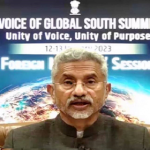While defining the thrust of India’s G20 presidency, External Affairs Minister S. Jaishankar has often talked about India serving as “the voice of the Global South.” Acting on this concept, on 12–13 January 2023 New Delhi convened a virtual summit of developing countries and christened it the Voice of the Global South Summit. It was projected as the largest digital conference of the leaders and ministers of the developing world.
India’s goal was to consult developing countries not represented in G20, on their developmental priorities and their expectations of India’s presidency. The idea was to ensure that developing countries feel better engaged with the G20 process and, in turn, the G20 can produce better results to promote “human-centric-development.” No previous host of the G20 has conceived of such a conference before.
When the news of the planned summit became known, the media’s curiosity was focused on whether Pakistan and China would be invited. The answer was clear. No, Pakistan was not considered, given its adversarial attitude towards India. Nor were China and other emerging economies invited to this summit, for India has already been holding multiple consultations with them as part of the continuing G20 process.
A total of 125 nations took part in the digital conference. The geographical breakup was: 29 countries from Latin America and the Caribbean, 47 from Africa, seven from Europe, 31 from Asia, and 11 from Oceania. Of the lot, 11 countries participated at the leaders’ level at the inaugural session and seven in the deliberations at the concluding session, both chaired by Prime Minister Narendra Modi.
The conference had 10 sessions. Besides the two leaders’ sessions, there were eight Ministerial-level thematic sessions with ministers of finance, trade, environment, energy, health, and education. Two sessions were set aside for the foreign ministers to focus on the priorities of the Global South, and their suggestions for India as G20 president.
Meticulous research reveals that valuable inputs were provided by important foreign participants. For example, President Filipe Nyusi of Mozambique emphasized the need for concerted global attention to specifically promote the interests of the developing world. President Muhammadu Buhari of Nigeria drew attention to the huge debt burden that has derailed many countries’ development plans. Developing countries, they said, should collaborate and present their “collective demands to the Global North.”
Bangladesh Prime Minister Sheikh Hasina presented a package of six developmental proposals: maintaining world peace and stability; creating a new paradigm to tackle inequality holistically in accord with SDGs; special financing for the most vulnerable nations; bridging the digital divide; ensuring that all human beings, including Myanmar’s Rohingya refugees sheltered in Bangladesh, have an equal right to lead a decent life; and strengthening South-South and tripartite cooperation to ensure global human development.
PM Modi was in agreement, seeking “a human-centric globalization”. He assured his guests that India’s G20 Presidency would carry their messages to its 19 constituents.
Senior officials in the G20 Secretariat say the summit’s aim was to obtain in greater detail, information at the micro level and the latest thinking of the highest-level representatives of the Global South.
The summit seems to have had some tangible outcomes, and points of agreement.
- Significance of South-South cooperation was noted as was the imperative of collectively shaping the global agenda;
- In health, an emphasis on traditional medicine, developing regional hubs for healthcare, and digital health solutions;
- Sharing of best practices in vocational training and use of technology for distance education;
- The deployment of digital public goods to increase financial inclusion at scale in developing countries;
- Increased investment in connectivity infrastructure;
- Reiterating that the developed world has not fulfilled its obligations on climate finance and technology;
- Importance of controlling emissions in production and moving away from ‘use and throw consumption’, towards more environmentally sustainable lifestyles.
Modi also announced five new initiatives by India, with details to follow: i) Arogya Maitri (Wellness Friendship), ii) Global South Center of Excellence, iii) Global South Science and Technology Initiative, iv) Global South Young Diplomats Forum, and v) Global South Scholarships.
Will this result in real change and outcomes? As a founding member of the Non-Aligned Movement (NAM) and G77, India has long been aware of the needs of the Global South. That region has not had strong enough leadership to command global clout. India is claiming that space, and is well-positioned to do so. The Asian Tigers have moved into middle income, and China will soon enter the club of developed nations. India straddles both worlds: its development metrics are closer to those of the Global South, whilst its democratic and entrepreneurial metrics carry enough remarkable and self-driven democratic and free market development to place it among the best, with world class industries like auto, IT services, pharma. It makes India an achievable model for the Global South.
A clear win was India’s asserting its competitive position vis-à-vis China. The spectacular success in persuading 125 developing nations to participate, showed India’s equity to be intact, despite a perception that in the past decade, India has moved away from NAM and closer to the developed West. The summit has enabled New Delhi to convincingly project itself as a vital player on the international stage. India can now take a Global South-favoured focus to its G20 presidency.
Rajiv Bhatia is Distinguished Fellow for Foreign Policy Studies, Gateway House, and a former ambassador.
A version of the article earlier appeared in Hindustan Times.


